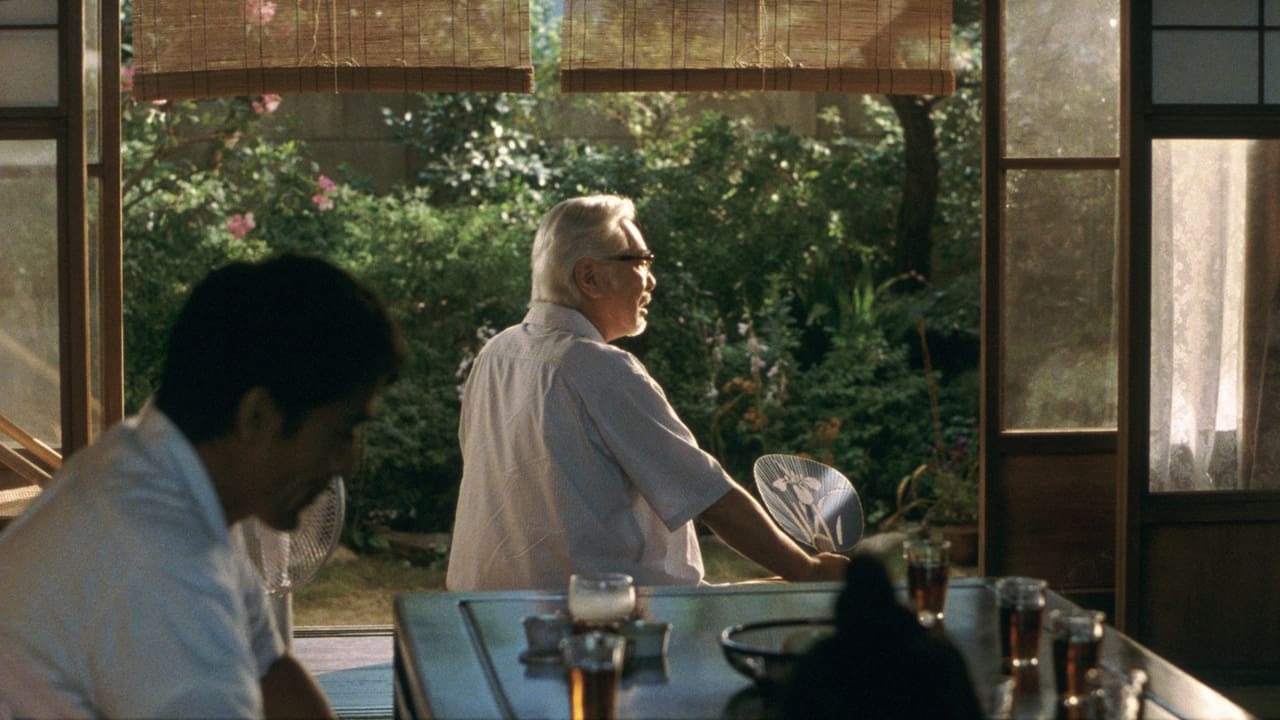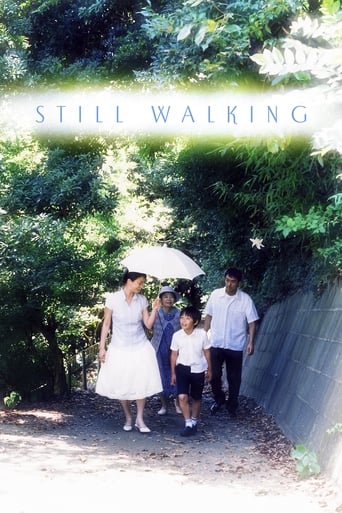

Overrated and overhyped
... View Moreit is the rare 'crazy' movie that actually has something to say.
... View MoreNot sure how, but this is easily one of the best movies all summer. Multiple levels of funny, never takes itself seriously, super colorful, and creative.
... View MoreIt is neither dumb nor smart enough to be fun, and spends way too much time with its boring human characters.
... View MoreAt the risk of stating the obvious this is a very "japanese" movie, and those who have seen a few will know what I mean. Another reviewer has, with some justification, decried the notion that because a movie is Japanese it seems to automatically attain some sort of semi-mythical status that the same movie made in (say) America would not. Certainly there is a genre of Japanese movies that fall into the "movies where nothing happen" category, and as with many forms of art, sometimes we mistake emptiness and simplicity with great meaning. Sometimes it's hard to tell where greatness actually exists and where we make it up for ourselves, although I suppose since the final result is the same it is a bit of a moot point.This movie borrows heavily from "Tokyo Story", another glacially paced movie of the inter-generational genre, but whereas the thrust of that movie was the younger generation's indifference and lack of time for the older generation this one is more about the simmering conflicts related to the death of a son, barely concealed resentments related to career choices, the failure to meet fatherly expectations, a mother's long held grudges, etc. As a family meets to commemorate the death of a son, we see a fine web of cracks start to radiate, all bubbling away nicely within the perfectly regimented framework of Japanese politeness and etiquette. The cracks are delicate but deep as the characters tip-toe around the many issues that interconnect 3 generations. Lurking below the surface of civility we see unpleasant aspects of most of the characters but in true Japanese style there are no raised voices, no shouting matches, no slammed doors, no accusations, no resolutions, no explosions, no car chases, no nudity, no violence - just swirling undercurrents. Some people will like this, others will not, and that is fine.I enjoyed this movie, but it was not a world shattering event. I thought some opportunities for development were missed and I was particularly annoyed when the movie did not finish immediately after the narration near the end. This could have been a totally killer statement, at last, a statement of truth and brutal cruelty to contrast cataclysmically with the hour of banal politeness and withholding of feelings that preceded it. This would have given the whole movie some meaning and bite, but no, they had to spoil it by reverting to the pretense of everyone playing happy families.In summary a good movie that those used to the "japanese" pace will enjoy, but probably not one that will change your life.
... View Morea family reunion in memory of a person. a brother. a sister. theirs families. the parents. a prey-guest. feelings, dialogs, emotional walls. all in Japanese manner. all as circle of a rite. and traces of meeting. more than a movie, Aruitemo aruitemo is a picture. of family relationships., shadow of generations, values, gentle cruelty, generous gifts, images about the other, yellow butterflies, tombs and the words behind walk to home. it is, in same measure, a window. to the sense, common sense of existence. for the bricks of silence and wind of impressions. for colors of profound emotions who becomes cell for soul of an old doctor or for devoted wife. for a son who remains in very large measure stranger, for a daughter who create a future who change universe of her parents. like in case of tea, important in this case remains final taste. as heart of colors, sounds, impressions.
... View MoreThis movie is written, scripted, edited, and directed by the unusually prolific director Hirokazu Koreeda, who's every movie seems to win at international film festivals. This movie "Aruitemo Aruitemo" (walking, walking - endless walk) is no exception, winning four international film awards, and two domestic awards.Ryota Yokoyama (Hiroshi Abe), his wife Yukari (Yui Natsukawa), and their son from Yukari's previous marriage Atsushi (Shohei Tanaka) is on their way back to Ryota's parent's house for the 15th anniversary of Ryota's older brother's death. Ryota's father's family consists of father Kyohei (Yoshio Harada), mother Toshiko (Kiki Kirin), and daughter Chinami Kataoka (YOU), her husband Nobuo (Kazuya Takahashi), and their two children Riku (Ryoga Hayashi), and Satsuki (Hotaru Nomoto). In a way, father who's a retired family doctor, and his family has never recovered from the death of Ryota's brother Junpei who died while trying to save a drowning boy Yoshio Imai (who survived and was visiting to offer incense to Junpei's spirit). When Ryota, and Junpei was a child they had aspiration to become a doctor like their father. Something changed Ryota, and he never pursued becoming a doctor, and became an antique restorer. His father still moans the loss of Junpei who he was counting to take over his business. Father sees Ryota as a failure, and their relation is not quite good. Ryota who's currently don't have a job feels uncomfortable in every situation. He even says to Kyohei "Is being a doctor so great !? We don't know how brother would have been either(If he had lived).". As the story progresses, history, and the story of each of the character's life gets revealed. Toshiko bring out an old record titled "Bluelight Yokohama" (Performed by Ayumi Ishida) at the family dinner, and plays it. It was a song she heard 30 years ago when she went to check out the apartment of a woman Kyohei was having extramarital affair with. But family tie dies hard, and Ryota says to Kyohei "Some day (I'll take you to see a game of soccer)". Seven years later, both Kyohei and Toshiko are dead, and Ryota's family has a new member - a daughter. Together they return to pay respect to the grave of their family. Nothing spectacular happens in this movie, but as I watched the first 10 minutes, I was already enthralled by the acting, and the story. I honestly felt that "I don't care if nothing happens, I'm intrigued by this family, and I want to see more.". Details are written superbly. The discomfort Atsushi feels with his cousins, the obligation Yukari feels towards Ryota's parents. All adds to the friction each are feeling in their lives. Mother played by Kiki Kirin is so perfect for the role. Without her, this movie wouldn't have been as good as it is. Hiroshi Abe, and Yui Natsukawa reprises the duo after "Kekkon Dekinai Otoko", and are superb match as modern husband and wife.The people in this movie seems to have lived their lives without a plan, didn't know when to let go, and plan their actions for the future. The death of Junpei seemed have negatively affected the whole family forever. Good movie that reflects the life of Japanese family in an authentic way. Only Japanese movies seems to be able to go so deeply into subtleties of family affairs as this one. You need to see this movie to appreciate family affairs.
... View MoreI liked Air Doll so much I decided to seek out more films made by its director Hirokazu Kore'eda. Imagine you have a new friend in life, someone you have a fondness and respect for, and they invite you along to meet the family of one of their best friends. You'll probably attend with an optimistic attitude, thinking the old adage "friends of yours are friends of mine." Such was my approach to seeing this film.There is a rich tradition of the family drama in Japanese cinema and this is a worthy addition to it. Still Walking observes and reveals the humor, history, and hidden emotions of an extended family over the course of twenty-four hours. A brother and sister, their spouses and children, attend a yearly gathering at the home of their parents to commemorate the death of their older brother, the pride of the parents, who died accidentally fifteen years ago while attempting to save a young boy, a stranger, from drowning.The film has a languid pace and a subtle sense of humor. There is a stereotypical grouchy and reserved father who has a stereotypically antagonistic relationship with his second son, a doting and good-humored mother, a loving and amiable sister. It seems like there may not be anything new here. There really isn't, and not much happens until another annual guest to the gathering shows up. He is the boy the older brother saved from drowning. He's an overweight, fidgety, perspiring loser. He is extremely uncomfortable and we can sense the parent's resentment that it was not him who died instead of their son.There was something about Air Doll that bothered me. There is a scene where the Air Doll meets, literally, her maker. The man basically essays to her on the meaning of the film: aren't human beings just empty vessels too, desiring and needing to be filled up? I've come to think that Kore'eda didn't trust his audience, or perhaps himself, enough to let the film speak for itself. He felt the need to explain it. There is a similar scene in Still Walking. After the ill-at-ease boy leaves the family's home the son observes to his mother that it seems almost cruel to invite him as he seems so uncomfortable, almost tortured by it. The mother acknowledges this and says "That's why we invite him." The scene should have cut right there but Kore'eda has the mother discourse on the necessity of this sadism.Even with that flaw, and the fact that Still Walking doesn't present an original scenario, I still loved it. I enjoyed meeting this family. Kore'eda and the cast bring a freshness to the family drama staple of Japanese cinema. The photography is beautiful, the direction is fluid and accomplished, the performances superb, and there is a surprisingly good amount of subtle humor throughout the film. Highly recommended to those who enjoy the slow-paced and thoughtful.
... View More